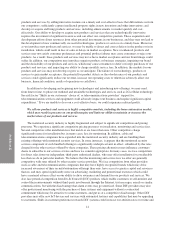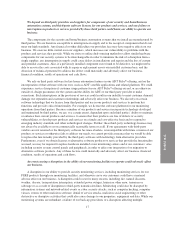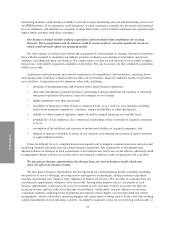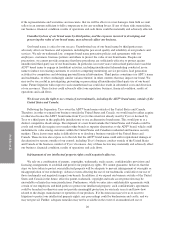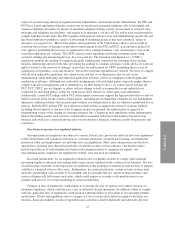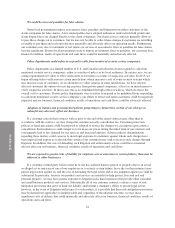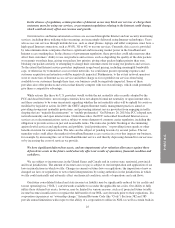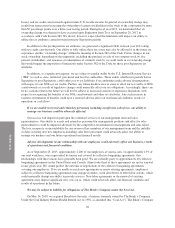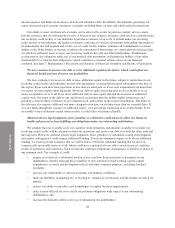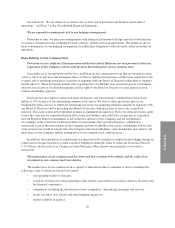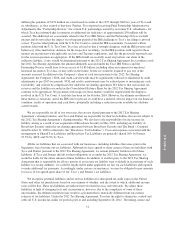ADT 2015 Annual Report Download - page 97
Download and view the complete annual report
Please find page 97 of the 2015 ADT annual report below. You can navigate through the pages in the report by either clicking on the pages listed below, or by using the keyword search tool below to find specific information within the annual report.
FORM 10-K
subject to an increasing amount of regulation in the United States and Canada. In the United States, the FTC and
FCC have issued regulations that place restrictions on unsolicited automated telephone calls to residential and
wireless telephone subscribers by means of automatic telephone dialing systems, prerecorded or artificial voice
messages and telephone fax machines, and require us to maintain a “do not call” list and to train our personnel to
comply with these restrictions. The FTC regulates both general sales practices and telemarketing specifically and
has broad authority to prohibit a variety of advertising or marketing practices that may constitute “unfair or
deceptive acts or practices.” Most of the statutes and regulations in the United States allow a private right of
action for the recovery of damages or provide for enforcement by the FTC and FCC, state attorneys general or
state agencies permitting the recovery of significant civil or criminal penalties, costs and attorneys’ fees in the
event that regulations are violated. The CRTC enforces rules regarding unsolicited communications using
automatic dialing and announcing devices, live voice and fax. The Canadian Anti-Spam Law (“CASL”)
regulations prohibit the sending of commercial emails without prior consent of the consumer or an existing
business relationship and sets forth rules governing the sending of commercial emails. CASL allows for a private
right of action for the recovery of damages or provides for enforcement by CRTC permitting the recovery of
significant civil penalties, costs and attorneys’ fees in the event that regulations are violated. We strive to comply
with all such applicable regulations, but cannot assure you that we or third parties that we rely on for
telemarketing, email marketing and other lead generation activities will be in compliance with all applicable
regulations at all times. Although our contractual arrangements with such third parties expressly require them to
comply with all such regulations and to indemnify us for their failure to do so, we cannot assure you that the
FTC, FCC, CRTC, private litigants or others will not attempt to hold us responsible for any unlawful acts
conducted by such third parties or that we could successfully enforce or collect upon such indemnities.
Additionally, certain FCC rulings and/or FTC enforcement actions may support the legal position that we may be
held vicariously liable for the actions of third parties, including any telemarketing violations by our independent,
third party authorized dealers that are performed without our authorization or that are otherwise prohibited by our
policies. Both the FCC and the FTC have relied on certain actions to support the notion of vicarious liability,
including but not limited to, the use of the Company brand or trademark, the authorization or approval of
telemarketing scripts or the sharing of consumer prospect lists. Changes in such regulations or the interpretation
thereof that further restrict such activities could result in a material reduction in the number of leads for our
business and could have a material adverse effect on our business, financial condition, results of operations and
cash flows.
Our business operates in a regulated industry.
Our operations and employees are subject to various federal, state, provincial and local laws and regulations
in the United States and Canada in such areas as consumer protection, occupational licensing, environmental
protection, labor and employment, tax and other laws and regulations. Most states and provinces in which we
operate have licensing laws directed specifically toward the security services industry. Our business relies
heavily upon the use of both wireline and wireless telecommunications to communicate signals, and
telecommunications companies are regulated by federal, state and local governments.
In certain jurisdictions, we are required to obtain licenses or permits in order to comply with standards
governing employee selection and training and to meet certain standards in the conduct of our business. The loss
of such licenses or permits or the imposition of conditions to the granting or retention of such licenses or permits
could have a material adverse effect on us. Furthermore, in certain jurisdictions, certain security systems must
meet fire and building codes in order to be installed, and it is possible that our current or future products and
service offerings will fail to meet such codes, which could require us to make costly modifications to our
products and services or to forgo marketing in certain jurisdictions.
Changes in laws or regulations could require us to change the way we operate or to utilize resources to
maintain compliance, which could increase costs or otherwise disrupt operations. In addition, failure to comply
with any applicable laws or regulations could result in substantial fines or revocation of our operating permits
and licenses. If laws and regulations were to change or if we or our products failed to comply with them, our
business, financial condition, results of operations and cash flows could be materially and adversely affected.
23



